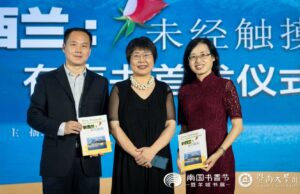Next Branch Meeting
Wednesday, 20 April 2016 at 5.45pm
Dr Hamish Campbell
Will speak on
Zealandia: Our Continent Revealed
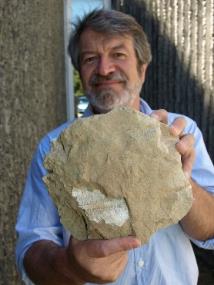
“I am a palaeontologist
after all”
Dr Hamish Campbell is a senior scientist with GNS Science. He began his professional career as a paleontologist with the New Zealand Geological Survey in 1978. GNS Science formed in 1992 and since then Dr Campbell has been largely involved in research on the origins of the basement greywacke rocks of New Zealand. However, he may be best known for his geological research in the Chatham Islands and his role as geologist and science communicator at Te Papa – including the ‘Awesome Forces’ exhibition.
In his presentation, Dr Campbell will describe the geological basis for regarding New Zealand as the emergent part of an otherwise submerged continent. Named Zealandia in 1995, it is about half the size of Australia and is 95% submarine. He will also speak on his connections with China.
An optional Chinese buffet meal, supplied by the Fujiyama Café, will follow the meeting at 7pm. Orders for the $12 meal (please pay at the door) will be taken up till 6pm. If you think you may be arriving late, please let the Secretary know in advance.
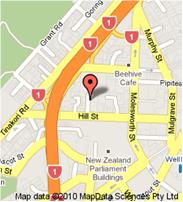 Connolly Hall
Connolly Hall
Guildford Terrace, off Hill Street, Thorndon, Wellington (see map)
(Car park up Guildford Tce beside Hall)
(A full PDF of this newsletter is available at NZCFS Wellington Newsletter April 2016)
ALSO COMING UP THIS MONTH
2 Apr Mandarin Corner, Seminar Room, 20 Kelburn Parade, Victoria University of Wellington
28 Apr Blind Shaft (Chinese film), Committee Room One, WCC, 101 Wakefield Street.
MEETING DATES FOR 2015
The dates Connolly Hall has been booked for monthly meetings this year are 18 May, 15 June, 20 July, 31 August, 21 September, 19 October and 16 November.
NEW NZCFS MEMBERS
The NZCFS would like to warmly welcome Chris Lipscombe, Adrian & Margaret Macey, Zhidong Yu & Ning Li, and Sam Macintosh. We look forward to your attendance at our events and meetings.
SUBSCRIPTION RENEWAL REMINDER
Please remember that 2016 membership subscriptions renewals are now due. Please renew if you have not already done so – download form here.
WELLINGTON BRANCH ANNUAL GENERAL MEETING 2016
The Branch AGM was held on Tuesday, 8 March 2016 at 5.45pm at Connolly Hall. President Michael Powles thanked those in attendance and spoke of his Presidents Report, available on our website at: https://nzchinasociety.org.nz/23940/nzcfs-wellington-branch-president-report-for-2015/. He specifically thanked Christine Strickland, who has been a longstanding member of the Branch, has held many Branch and National positions and most recently has been Vice President of the Wellington Branch. Her hard work and dedication to the Society, as well as her insight and advice, has been invaluable to the Branch, as well as her follow Committee members. Michael then went on to speak of the Branch, and the importance of youth within the Society, and working on rejuvenating the Branch leadership. He ended by speaking of the events achieved by the Branch last year, and wished a happy and prosperous Year of the Monkey to all our members.
The following nominated members were elected to the positions of:
President: Michael Powles. Vice President: Luke Qin.
Secretary: Graham Gibbs. Treasurer: Kirk McDowall.
Committee members: Bing Fon (Life Member), Rosemary Jones, Robert Lau, Pengbo Jiang, Diwen Cao and Deborah Robertson.
THE ENVIRONMENTAL DELEGATION TO CHINA 2016
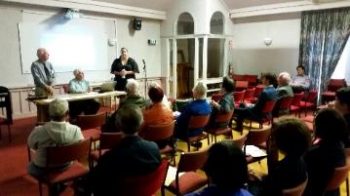 Following the Annual General Meeting, Deborah Robertson, a Wellington Branch Committee member, spoke on her experience being a NZCFS Youth Friendship Ambassador in 2014, in which she focused on mangrove forest conservation, and the upcoming Environmental Delegation to China. Deborah has experience in policy, community engagement, environmental planning and marine conservation. She currently works at the Ministry for the Environment.
Following the Annual General Meeting, Deborah Robertson, a Wellington Branch Committee member, spoke on her experience being a NZCFS Youth Friendship Ambassador in 2014, in which she focused on mangrove forest conservation, and the upcoming Environmental Delegation to China. Deborah has experience in policy, community engagement, environmental planning and marine conservation. She currently works at the Ministry for the Environment.
In relation to the Youth Ambassador, Deborah chose to research mangrove forest conservation and community values due to mangrove forests being an important ecosystem (for environmental, socio-cultural and economic reasons) that is undervalued and under threat. Mangrove forests are located across the southern coast of China and have experienced vast habitat loss. Although they are now well protected (in terms of habitat extent) they face on-going threats to their health, like pollution.
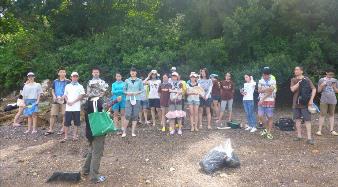 Deborah conducted her research in the Fujian province, and the aim of her research was to understand the values, knowledge and attitudes towards the conservation of mangrove forests by Fujian Province residents. During her presentation, she first spoke of her experience arriving in China. This was her first visit to China and she did find it overwhelming. However, she was able to spend time in a small village, Fu Gong Village, nearby a Mangrove Provincial Reserve in Long Hai, which had a quiet atmosphere she enjoyed. She also spent time in Xiamen city, near Yundang Lake, where mangroves have been planted. Deborah worked closely with the Confucius Institute in Xiamen and Xiamen University students, who helped with translations and local knowledge. During her time, she also helped volunteers plant mangroves and visited the protected habitats. For her research, Deborah asked citizens of Fu Gong Village and Xiamen to fill out questionnaires about their views of mangroves and their protection.
Deborah conducted her research in the Fujian province, and the aim of her research was to understand the values, knowledge and attitudes towards the conservation of mangrove forests by Fujian Province residents. During her presentation, she first spoke of her experience arriving in China. This was her first visit to China and she did find it overwhelming. However, she was able to spend time in a small village, Fu Gong Village, nearby a Mangrove Provincial Reserve in Long Hai, which had a quiet atmosphere she enjoyed. She also spent time in Xiamen city, near Yundang Lake, where mangroves have been planted. Deborah worked closely with the Confucius Institute in Xiamen and Xiamen University students, who helped with translations and local knowledge. During her time, she also helped volunteers plant mangroves and visited the protected habitats. For her research, Deborah asked citizens of Fu Gong Village and Xiamen to fill out questionnaires about their views of mangroves and their protection.
Deborah’s findings highlighted that Fujian residents cared about the mangrove forests, and there was general awareness of the benefits of mangroves, as well as the major threats, although Fu Gong village residents had a higher level of environmental knowledge, probably owing to their close proximity to a reserve. Ninety six percent believed all mangrove forests should be protected, and most people thought that more should be planted. Following her research, Deborah has given her findings to the Xiamen University and the wider mangrove conservation network.
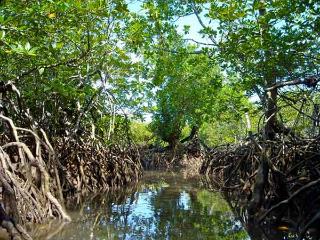 There were a number of questions asked about her research at the Branch meeting, including Deborah’s previous experience with the environment, her assistance from students in Xiamen, the biodiversity present in the mangroves (including crabs and spiders), and local attitudes towards conservation – there are volunteers actively engaged in planting mangroves, and some areas are completed protected while other areas are more like tourist attractions. Despite the protection, there was evidence of construction works in some areas. Overall, the locals were invaluable to her work and research, as well as assistance from the NZCFS, the Confucius Institute, Xiamen University and the China Mangrove Conservation Network.
There were a number of questions asked about her research at the Branch meeting, including Deborah’s previous experience with the environment, her assistance from students in Xiamen, the biodiversity present in the mangroves (including crabs and spiders), and local attitudes towards conservation – there are volunteers actively engaged in planting mangroves, and some areas are completed protected while other areas are more like tourist attractions. Despite the protection, there was evidence of construction works in some areas. Overall, the locals were invaluable to her work and research, as well as assistance from the NZCFS, the Confucius Institute, Xiamen University and the China Mangrove Conservation Network.
Deborah also spoke on the 2016 Environmental Delegation to China, supported by the NZCFS (Simon Deng Li Fund) and Beijing Youxie. The objective of the delegation is for New Zealand environmental professionals to build relationships with their Chinese counterparts and better understand Chinese culture and worldviews; learn about China’s natural environment and the pressures it faces; and challenges and successes in terms of policy, management, innovation and community action; and of course, vice versa.
Along with Deborah, there are five other delegates. Emma Hill also works at the Ministry of the Environment (in the Climate Change team), and is interested in marine conservation and indigenous environmental perspectives. Next, Dr Marc Shallenberg is a freshwater and estuaries scientist and research fellow at Otago University. He is also the President of the NZ Freshwater Sciences Society. Leana Barriball, who is the Manager of Communications and Resource Management for Te Runanga o Tao Rangatira, is keen to learn if and how China has aspirations to look at and acknowledge indigenous ecological knowledge. In addition, Shreejan Pandey, currently managing the Electric Power Engineering Centre at the University of Canterbury, has interests in China’s renewable energy industry and policy. Finally, Kirk McDowall, a fellow NZCFS committee member who works at the Environmental Protection Authority, who has interests in the social implications of environmental issues in China, and is currently learning Mandarin.
The delegation will be going to China in October 2016 for two weeks, with possible destinations including both rural and urban areas around Beijing, Sichuan and Yunnan. We wish them all the best for their delegation, and look forward to hearing from them when they return.
2016 NZCFS NATIONAL CONFERENCE
 Now is the time to mark the New Zealand China Friendship Society’s National Conference and AGM in your diaries. The theme of the Conference is “Good things take time!” (好事多磨 – Hǎo shì duō mó). The Conference and the AGM will take place in the Village Hall of Tauranga’s Historic Village, on May 27 to 29, 2016. To register please go to the NZCFS website or go to: https://nzchinasociety.org.nz/23968/register-now-for-the-societys-national-conference-agm/ to download the registration form.
Now is the time to mark the New Zealand China Friendship Society’s National Conference and AGM in your diaries. The theme of the Conference is “Good things take time!” (好事多磨 – Hǎo shì duō mó). The Conference and the AGM will take place in the Village Hall of Tauranga’s Historic Village, on May 27 to 29, 2016. To register please go to the NZCFS website or go to: https://nzchinasociety.org.nz/23968/register-now-for-the-societys-national-conference-agm/ to download the registration form.
We hope that you will make it, and will also be able to enjoy the delights of Tauranga and the Bay of Plenty! The Wellington Branch will subsidise the first 10 members who request assistance with registration costs associated with attending the Conference.
MANDARIN CORNER 汉语角 Saturdays 3.15-5pm
Seminar Room, 20 Kelburn Parade, Victoria University of Wellington.
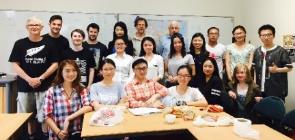 Mandarin Corner (Wellington), established in 1995 by NZCFS, is a weekly event where students learning Chinese meet with native speakers of Chinese for conversation and cultural activities in a friendly, relaxed setting. Mandarin Corner is currently run by a core team of Mandarin Language Assistants and is open to all level. Come along if you are interested, and attendance is free. Mandarin corner does not run during school holidays. For more information contact Yinghui Li at [email protected].
Mandarin Corner (Wellington), established in 1995 by NZCFS, is a weekly event where students learning Chinese meet with native speakers of Chinese for conversation and cultural activities in a friendly, relaxed setting. Mandarin Corner is currently run by a core team of Mandarin Language Assistants and is open to all level. Come along if you are interested, and attendance is free. Mandarin corner does not run during school holidays. For more information contact Yinghui Li at [email protected].
NEW ZEALAND CHINESE LANGUAGE ASSOCIATION CHINESE FILM
中国电影 – Thursday 28 April 2016, 7.15pm
 Venue: Committee Room One, Wellington City Council, 101 Wakefield Street. Gold coin donation. With support from Confucius Institute, VUW.
Venue: Committee Room One, Wellington City Council, 101 Wakefield Street. Gold coin donation. With support from Confucius Institute, VUW.
(Please note that you need to press the buzz to the left of the Wakefield Street entrance, asking the security to let you. Txt 0210306853 if you cannot get in.)
Title: 盲井Blind Shaft [2003 Movie, 92 minutes]
Director: 李杨Yang Li. Cast: 王双宝Shuangbao Wang, 王宝强Baoqiang Wang, 李易祥Yixiang Li
Two Chinese coal miners have hit upon the perfect scam: murder one of their fellow mine workers, make the death look like an accident, and extort money from the boss to keep the incident hushed up. For their latest “mark,” they choose a naive teenager from a small village, and as they prepare to carry out their newest plan, things start to get complicated…
VOLUNTEERING WITH ‘XINXING AID FOR STREET KIDS’
In November 2011, the NZCFS published a story about the need for a doctor/psychologist who desperately wanted to help traumatised children in an orphanage near Xi’an. The NZCFS was fortunate in finding psychologist graduate, Joanna Chan, who last year volunteered to assist the children during her gap year. Joanna wanted some work experience and also hankered for an overseas adventure and she explains what she found at the orphanage and how she was able to help.
 In 2015, Johanna was fortunate to have the opportunity to volunteer with Baoji Xinxing Aid for Street Kids – 宝鸡新星流浪儿童援助中心. This is a non-profit organisation that makes a positive difference to many young lives. As an organisation, Xinxing aims to create a better tomorrow for children in difficult circumstances by providing support, new opportunities, early-stage interventions, and outreach aid to those in need.
In 2015, Johanna was fortunate to have the opportunity to volunteer with Baoji Xinxing Aid for Street Kids – 宝鸡新星流浪儿童援助中心. This is a non-profit organisation that makes a positive difference to many young lives. As an organisation, Xinxing aims to create a better tomorrow for children in difficult circumstances by providing support, new opportunities, early-stage interventions, and outreach aid to those in need.
Over my 5-week stay with Xinxing, Joanna was involved with the Baoji Xinxing and Weinan Xinxing summer camps for underprivileged children, and children with incarcerated parents. Through these experiences she was able to catch a glimpse of the amazing work that Xinxing provides. The Xinxing summer camps gave children the opportunity to experience things they wouldn’t have had the chance to experience, whilst also teaching children to how to respect others and how to communicate in positive ways.
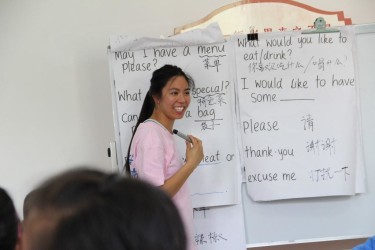
She was also given the opportunity to spend time with the long-term residents living at the Baoji Xinxing Centre. These residents were children with mild cognitive disabilities (e.g. autism), physical disabilities (e.g. cerebral palsy), or children with difficult family circumstances. Spending time with these children highlighted the differences and similarities between Eastern and Western perspectives about children with impairment, and provided insight to how Xinxing aims to bridge the gap between cultures to help improve the children’s lives.
To read more about her experience, please visit https://nzchinasociety.org.nz/23528/volunteering-with-xinxing-aid-for-street-kids/.
PERCEPTIONS OF ASIA 2015 SURVEY
 An Asia New Zealand Foundation survey finds New Zealand still has a long way to go in its understanding of Asia, despite high recognition of the region’s economic and cultural importance.
An Asia New Zealand Foundation survey finds New Zealand still has a long way to go in its understanding of Asia, despite high recognition of the region’s economic and cultural importance.
Nearly two-thirds (63 percent) of people who answered the survey, New Zealanders’ Perceptions of Asia and Asian Peoples 2015, said they knew little or nothing about Asia. This was despite the fact the vast majority of people (82 percent) felt it was important for New Zealand to develop economic and cultural ties with the region, and despite Asia being seen as the second most important region to New Zealand (behind Australia).
Yet, at a personal level, the survey also shows New Zealanders feel increasingly connected to Asian people. In 2015, about half (51 percent) of people reported having at least a fair amount to do with Asian peoples and cultures – up from 30 percent in 1998. Only a minority of people – 25 percent – felt Asian people did not mix well with New Zealanders; this is the lowest level ever recorded by the survey. Those who had more involvement with Asian cultures or knowledge of Asia reported more positive views about Asia and Asian peoples.
Asia New Zealand Foundation executive director Simon Draper said the survey showed media coverage played an important role in influencing New Zealanders’ views of Asia. “The Foundation has been carrying out this survey for nearly two decades and the general trend has been increasing positivity towards Asia and its peoples. But we have seen a few peaks and troughs related to current affairs”.
“What’s encouraging to us is that New Zealanders value their personal interactions with Asian people, want to learn more about Asian cultures and have recognised they need to know more about the region. The survey confirms that knowledge of Asia and contact with Asian peoples and cultures goes hand in hand with positive feelings about the region as a whole”.
To read the whole report, please go to: http://www.asianz.org.nz/bulletin/perceptions-asia-2015-survey
NZCFS EXPLORE CHINA, THE SOUTH-WEST TOUR, 23 DAYS OCTOBER 10-NOVEMBER 2 2016
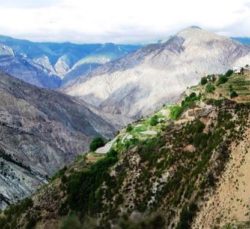 The Society offers a further educational tour in the “Explore China” series. The tour will visit the two SW provinces of Sichuan and Yunnan for an in-depth experience of this area. A reasonable level of fitness is needed to accommodate the travel, going over 4000 masl on occasions. There has been considerable interest in this tour and only a few places are now available. If interested please contact Ann White: ph 03 6148944, [email protected] as soon as possible.
The Society offers a further educational tour in the “Explore China” series. The tour will visit the two SW provinces of Sichuan and Yunnan for an in-depth experience of this area. A reasonable level of fitness is needed to accommodate the travel, going over 4000 masl on occasions. There has been considerable interest in this tour and only a few places are now available. If interested please contact Ann White: ph 03 6148944, [email protected] as soon as possible.
See https://nzchinasociety.org.nz/22403/nzcfs-explore-china-the-south-west-tour for full details.



